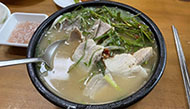Staff Reporter
Producer prices rose by 7.5 percent in September from a year ago after rising 7 percent in July and 6.8 percent in June, and consumer prices gained 3.9 percent in September from a year ago.
According to the Bank of Korea (BOK), the index measuring inflationary pressures, calculated from prices of 923 items, reached an record-high of 109.1 last month.
The index stood at 101.1 in August 2003 and 100.1 in 1998 on average.
Wholesale prices or producer prices refer to the prices of wholesale goods and commodities and are sometimes regarded as an index for inflation.
Prices of industrial products increased by 10 percent from the same month last year and by 1.1 percent from August, while the index measuring inflationary pressure in the agricultural and fisheries sectors rose 10.1 percent but fell by 4.2 percent from August.
Service fees were 2.9 percent higher than a year ago, but 0.3 percent lower than a month ago.
BOK officials said that hikes in wholesale prices were attributed to soaring crude oil prices and prices of other raw materials such as scrap metals last month.
In the meantime, consumer prices rose 3.9 percent in September from the same period last year due mainly to surging international crude oil prices despite relatively stabilizing prices of agricultural and fisheries produce.
The figure, however, was a 0.9 percentage point drop from August when prices increased by a 37-month high of 4.8 percent over a year ago after rising 4.4 percent in July and 3.6 percent in June, according to the National Statistical Office (NSO) Tuesday.
Consumer prices remained unchanged last month from August and the average monthly consumer price increase through September stood at the government’s target range of 3.6 percent.
NSO officials said prices of agricultural and fisheries goods remained stable as a result of abundant supplies in time for the Chusok holiday, but public services charges and prices of industrial goods increased significantly last month due to rising crude oil prices.
The consumer price index for daily necessities, consisting of 154 basic items such as rice and ramyun, increased 5.7 percent in September from the corresponding period last year and 0.2 percent from August.
The consumer price index for fresh foods, consisting of agricultural, fisheries and dairy products also increased 7.3 percent in September from the same month last year but was down 1.6 percent from August.
``Even though the consumer price increase moderated at 3.9 percent in September, compared to those of the previous months, consumers are likely to see prices of various goods and services rise significantly in coming months since producer prices have an impact on consumer prices about three months later,’’ BOK officials said.
However, the government is optimistic about maintaining a consumer price increase within the 3-percent range for this year despite planned hikes in public service charges in the near future and record-high oil prices, NSO officials said.
leehs@koreatimes.co.kr
스마터리빙
more [ 건강]
[ 건강]이제 혈관 건강도 챙기자!
[현대해운]우리 눈에 보이지 않기 때문에 혈관 건강을 챙기는 것은 결코 쉽지 않은데요. 여러분은 혈관 건강을 유지하기 위해 어떤 노력을 하시나요?
 [ 건강]
[ 건강]내 몸이 건강해지는 과일궁합
 [ 라이프]
[ 라이프]벌레야 물럿거라! 천연 해충제 만들기
 [ 건강]
[ 건강]혈압 낮추는데 좋은 식품
[현대해운]혈관 건강은 주로 노화가 진행되면서 지켜야 할 문제라고 인식되어 왔습니다. 최근 생활 패턴과 식생활의 변화로 혈관의 노화 진행이 빨라지고
사람·사람들
more
[한인단체 신년 인터뷰] 명원식 파바월드 회장… “한인 차세대 바르게 성장하는 토대 최선”
“한인 차세대들이 바르게 자랄 수 있는 토대를 만드는 것이 제가 파바월드의 회장으로 존재하는 유일한 이유입니다”한인사회의 대표적 청소년 봉사 …

LA한인회 멘토 프로그램 10일 스티브 강 위원장
LA 한인회(회장 로버트 안)가 한인사회 차세대 인재양성 노력의 하나로 ‘멘토를 만나다’ 프로그램을 정례화해 실시하고 있는 가운데 그 세 번째…
미주 한인의 날 기념… 잇달아 ‘코리안 나잇’
미주 한인들의 역사와 성취, 그리고 미국 사회에 기여해 온 발자취를 기리는 1월13일 ‘미주 한인의 날’을 맞아 LA의 주요 프로 스포츠 구단…
‘K-팝의 미래’ 세미나 16일 LA 문화원 개최
LA 한국문화원(원장 이해돈)은 세계한류학회(WAHS)와 함께 오는 1월16일(금) ‘케이팝 데몬 헌터스와 케이팝의 미래 세미나 및 라운드테이…
[한인단체 신년 인터뷰] LA 한인회 로버트 안 …
“더욱 적극적이고 실질적인 서비스로 한인들의 어려움을 돕고, 한인사회 발전에 앞장서겠습니다.”2026년 병오년 새해를 맞아 LA 한인회 로버트…
많이 본 기사
- 尹 ‘내란 우두머리’ 재판 내일 종료…사형? 무기징역? 구형 주목
- 트럼프, 각세우던 콜롬비아 대통령과 돌연 통화…백악관 초청도
- ‘범죄 제국’ 세운 프린스그룹 천즈…10대부터 PC방서 사이버범죄
- 베네수 임시대통령, 美의 석유 관여 옹호… “모두에 이익되게”
- 베네수 이어 그린란드…트럼프, 2년차 벽두부터 美우선주의 거친 질주
- “마두로 체포 환영하는 시민 잡아라”…휴대폰 뒤지고 불심검문도
- 미니애폴리스서 30대 여성, 이민단속요원 총격에 사망
- 베네수 이어 그린란드…트럼프, 2년차 벽두부터 美우선주의 거친 질주
- 경찰 꾸물대는 사이…의혹 핵심들 메신저탈퇴·전화교체 정황
- 트럼프, ‘유엔 산하기관 등 66개 국제기구서 탈퇴’ 서명
- 트럼프, 천정부지 집값에 “기관투자자 단독주택 매입금지 추진”
- 트럼프 50% 관세 압박에도 인도 경제 7.4% 성장 전망
- 차세대 리더 양성 위한 협력 강화
- ‘주사 이모’ 집 털렸다..박나래, 19금 행위 폭로→경찰 소환까지 ‘첩첩산중’
- 국무 “내주 덴마크와 그린란드논의…군사옵션 모든 현안에 유효”
- 머스크, 엔비디아 자율주행기술 견제… “5∼6년 이상 걸릴것”
- 삼성전자 메모리 초강세에 작년 매출 332.8조 ‘역대 최대’ 경신
- 뉴욕증시, 애플마저 아래에 둔 알파벳…혼조 마감
- 뉴욕시 ‘숨은 수수료’ 퇴출 나섰다 1
- “조폭 해외 도피→조세호 복귀”..폭로자, 분노 못 참고 또 글 올렸다
- ‘마구잡이 이민단속’ 제한 법안 속속 진전
- 일자리 위협하는 AI, 전문직도 대체한다… 컴퓨터 전공·로스쿨 졸업생들도 ‘취업난’ 극심
- 다니엘 ‘뉴진스 퇴출’..팬덤은 ‘대중에 퇴출’ 엔딩
- GCF 워싱턴, 신임회장 김신아 호(號) 출범
- 트럼프 “힘들고 어려운 시기에 내년 국방예산 1조5천억 달러 돼야”
- LA한인회 멘토 프로그램 10일 스티브 강 위원장
- ‘캄보디아 스캠범죄 설계자’ 프린스그룹 천즈, 체포돼 中송환
- “다저스가 기대한 그대로” 반쪽짜리였던 김혜성, 美 매체가 호평한 이유
- 트럼프, 방산기업들에 “배당할 돈으로 생산·유지보수 주력하라”
- 베네수 대통령 경호실장 해임…마두로 체포 ‘배신자’?
- “숫자 다루는 직업이지만 사람간 소통 · 신뢰가 먼저죠”
- ‘콜록콜록’ …워싱턴 독감환자 폭증
- 다우, 첫 49,000 돌파 증시 연초 랠리 지속
- 케네디에 관한 네 개의 이야기
- 캐릭터AI·구글, ‘챗봇이 청소년 자해 조장’ 소송 합의로 종결
- 컴퓨터 전공·로스쿨 졸업생들도‘취업난’극심
- [CES 2026 라스베가스서 개막] 인공지능 두뇌 장착 로봇… 완전체 자율주행차도
- ‘AI 강자’ 구글, 시총 2위로 올라서…6년여만에 애플 제쳐
- “JP모건체이스, 골드만삭스 대신 애플카드 발행 맡기로”
- 美, 베네수 석유자원 관할 본격화…경제이익·中견제 동시 추구
- ‘오징어 게임3’, 美배우조합 ‘스턴트 액션연기상’ 후보 올라
- ‘전반 슈팅 1개’ 한국 U23, 이란과 0-0 무승부... 아시안컵 첫판부터 ‘흔들’
- 日산업계, 中 ‘희토류 보복’에 불안감 확산…車생산 영향 클듯
- 해외 IB “올해도 美 성장률 韓보다 높아”…환율 상승 요인
- 제임스+돈치치 쌍포 60점 폭발…NBA 레이커스 3연승 행진
- “베네수 석유생산 증대”
- “美국무, 그린란드 군사작전 검토설 부인… ‘매입이 목표’ 발언”
- 美, ‘베네수와 연계’ 러 유조선 나포…미러 신경전 조짐
- [신년 집중기획/ 한인 정치력 신장 원년으로] 중간선거의 해… “투표 통해 한인 공직자 늘려야”
- 베네수엘라 국영회사 “美와 원유수출 협상 진전…상업적 차원”
1/5지식톡

-
 미 육군 사관학교 West Poin…
0
미 육군 사관학교 West Poin…
0https://youtu.be/SxD8cEhNV6Q연락처:wpkapca@gmail.comJohn Choi: 714-716-6414West Point 합격증을 받으셨나요?미 육군사관학교 West Point 학부모 모…
-
 ☝️해외에서도 가능한 한국어 선생님…
0
☝️해외에서도 가능한 한국어 선생님…
0이 영상 하나면 충분합니다!♥️상담신청문의♥️☝️ 문의 폭주로 '선착순 상담'만 진행합니다.☎️ : 02-6213-9094✨카카오톡ID : @GOODEDU77 (@골뱅이 꼭 붙여주셔야합니다…
-
 테슬라 자동차 시트커버 장착
0
테슬라 자동차 시트커버 장착
0테슬라 시트커버, 사놓고 아직 못 씌우셨죠?장착이 생각보다 쉽지 않습니다.20년 경력 전문가에게 맡기세요 — 깔끔하고 딱 맞게 장착해드립니다!장착비용:앞좌석: $40뒷좌석: $60앞·뒷좌석 …
-
 식당용 부탄가스
0
식당용 부탄가스
0식당용 부탄가스 홀세일 합니다 로스앤젤레스 다운타운 픽업 가능 안녕 하세요?강아지 & 고양이 모든 애완동물 / 반려동물 식품 & 모든 애완동물/반려동물 관련 제품들 전문적으로 홀세일/취급하는 회사 입니다 100% …
-
 ACSL 국제 컴퓨터 과학 대회, …
0
ACSL 국제 컴퓨터 과학 대회, …
0웹사이트 : www.eduspot.co.kr 카카오톡 상담하기 : https://pf.kakao.com/_BEQWxb블로그 : https://blog.naver.com/eduspotmain안녕하세요, 에듀스팟입니다…
케이타운 1번가
오피니언
 정숙희 논설위원
정숙희 논설위원케네디에 관한 네 개의 이야기
 마크 A. 시쎈 / 워싱턴포스트 칼럼니스트
마크 A. 시쎈 / 워싱턴포스트 칼럼니스트 [마크 A. 시쎈 칼럼] 트럼프의 20가지 업적
 김동찬 시민참여센터 대표
김동찬 시민참여센터 대표 [미국은 지금] 2026년 ‘손님’ 의식 버리고 ‘주인’ 입장을
 이현숙 수필문학가협회 이사장
이현숙 수필문학가협회 이사장 [수요 에세이] 이젠 끝이다 “Nevermore, Nevermore”
 최형욱 / 서울경제 논설위원
최형욱 / 서울경제 논설위원 [만화경] ‘가짜 일’ 줄이기
 민경훈 논설위원
민경훈 논설위원도널드 W 부시와 이라크 전의 추억
 황의경 사회부 기자
황의경 사회부 기자 타국에서, 다시 ‘우리’를 생각하다
 박원곤 이화여대 북한학과 교수
박원곤 이화여대 북한학과 교수 [백상논단] 붉은 말의 해, 한반도에 다시 오는 분기점
 홍용희 수필가
홍용희 수필가 [화요칼럼] 내 안의 바위
1/3지사별 뉴스

뉴욕시 ‘숨은 수수료’ 퇴출 나섰다
뉴욕시가 일반 소비 시장에 만연해 있는 ‘숨은 수수료’(Junk fee) 근절에 나섰다. 조란 맘다니 뉴욕시장은 5일 ‘숨은 수수료’ 및 ‘…
‘마구잡이 이민단속’ 제한 법안 속속 진전

VA 재무차관에 한인 제임스 허
30대 중반의 한인 제임스 허 씨(사진)가 버지니아 재무차관(Deputy Secretary of Finance)에 내정됐다. 아비가일 스팬버거…
‘콜록콜록’ …워싱턴 독감환자 폭증

베네수 이어 그린란드…트럼프, 2년차 벽두부터 美우선주의 거친 질주
2026년 새해 벽두부터 도널드 트럼프 대통령의 행보가 심상치 않다.집권 2기 2년차를 맞아 자신과 지지층의 이념이라 할 ‘미국 우선주의’ 구…
중부 캘리포니아 ‘한인 이민사’ 나왔다




















































.png)


댓글 안에 당신의 성숙함도 담아 주세요.
'오늘의 한마디'는 기사에 대하여 자신의 생각을 말하고 남의 생각을 들으며 서로 다양한 의견을 나누는 공간입니다. 그러나 간혹 불건전한 내용을 올리시는 분들이 계셔서 건전한 인터넷문화 정착을 위해 아래와 같은 운영원칙을 적용합니다.
자체 모니터링을 통해 아래에 해당하는 내용이 포함된 댓글이 발견되면 예고없이 삭제 조치를 하겠습니다.
불건전한 댓글을 올리거나, 이름에 비속어 및 상대방의 불쾌감을 주는 단어를 사용, 유명인 또는 특정 일반인을 사칭하는 경우 이용에 대한 차단 제재를 받을 수 있습니다. 차단될 경우, 일주일간 댓글을 달수 없게 됩니다.
명예훼손, 개인정보 유출, 욕설 등 법률에 위반되는 댓글은 관계 법령에 의거 민형사상 처벌을 받을 수 있으니 이용에 주의를 부탁드립니다.
Close
x